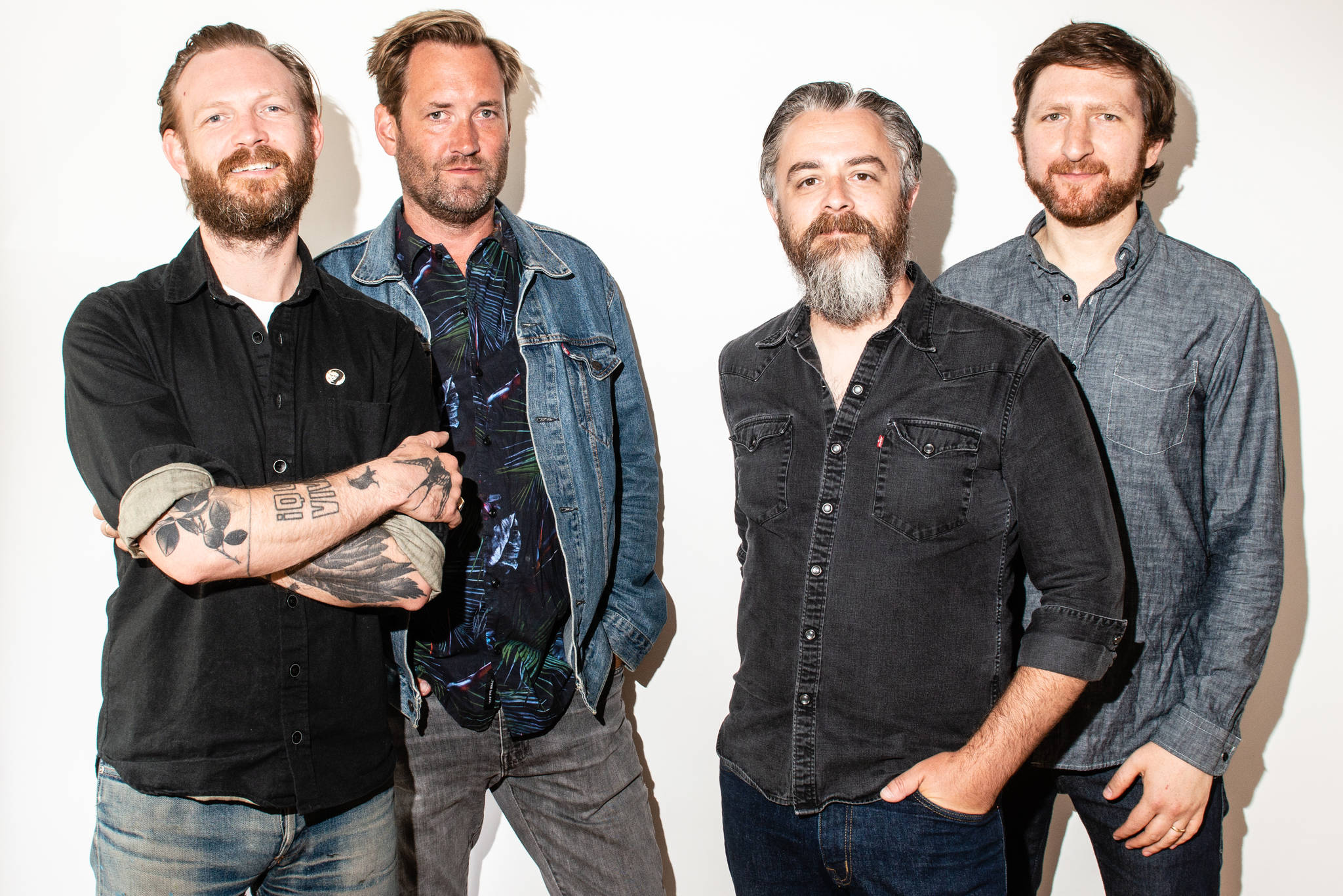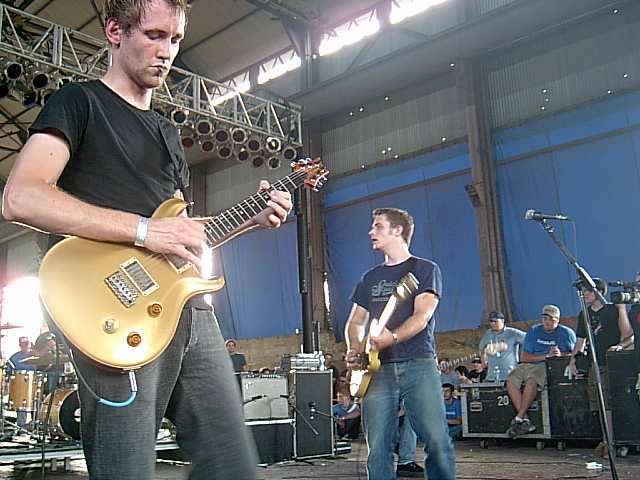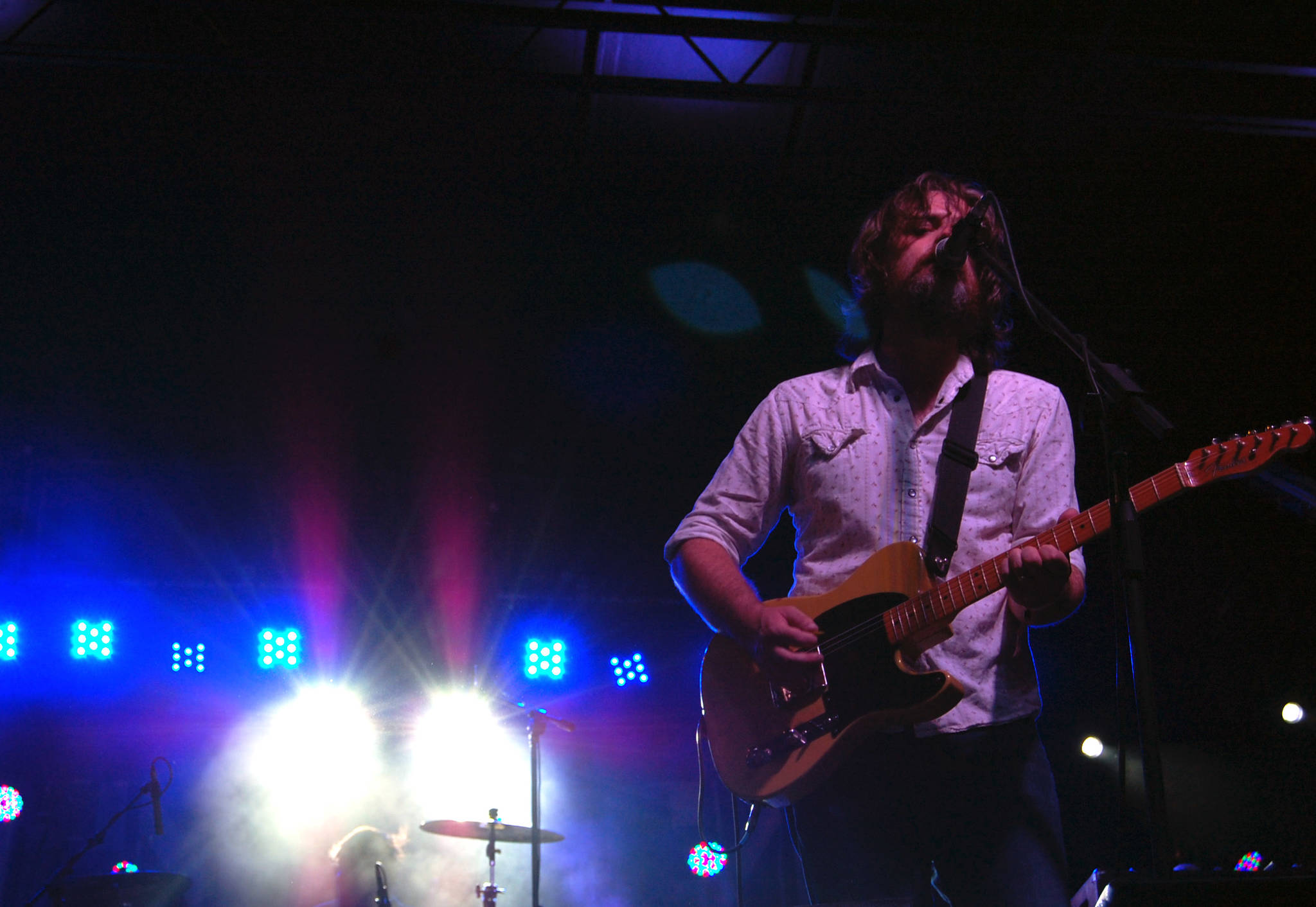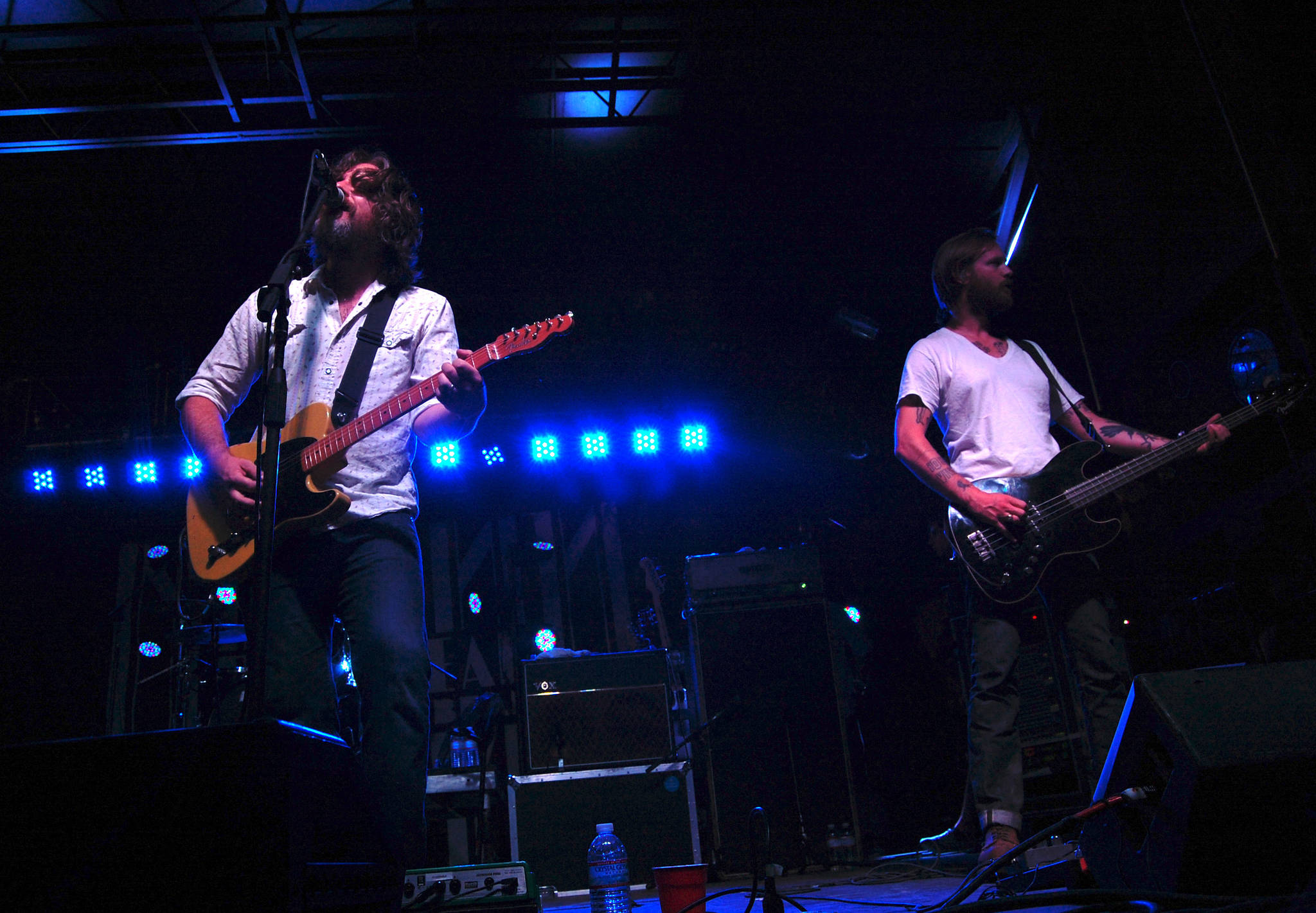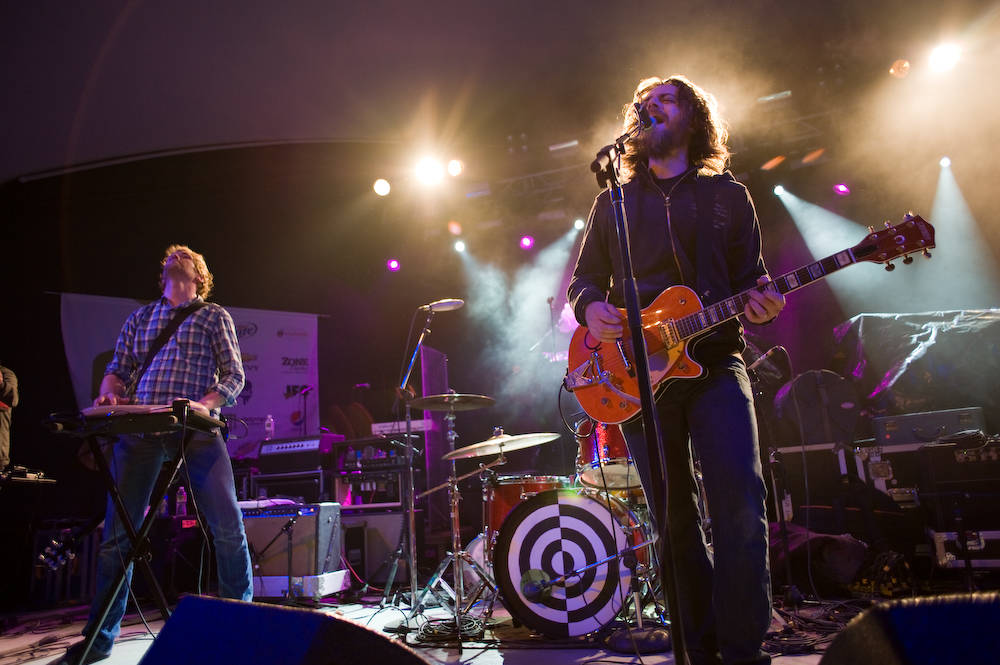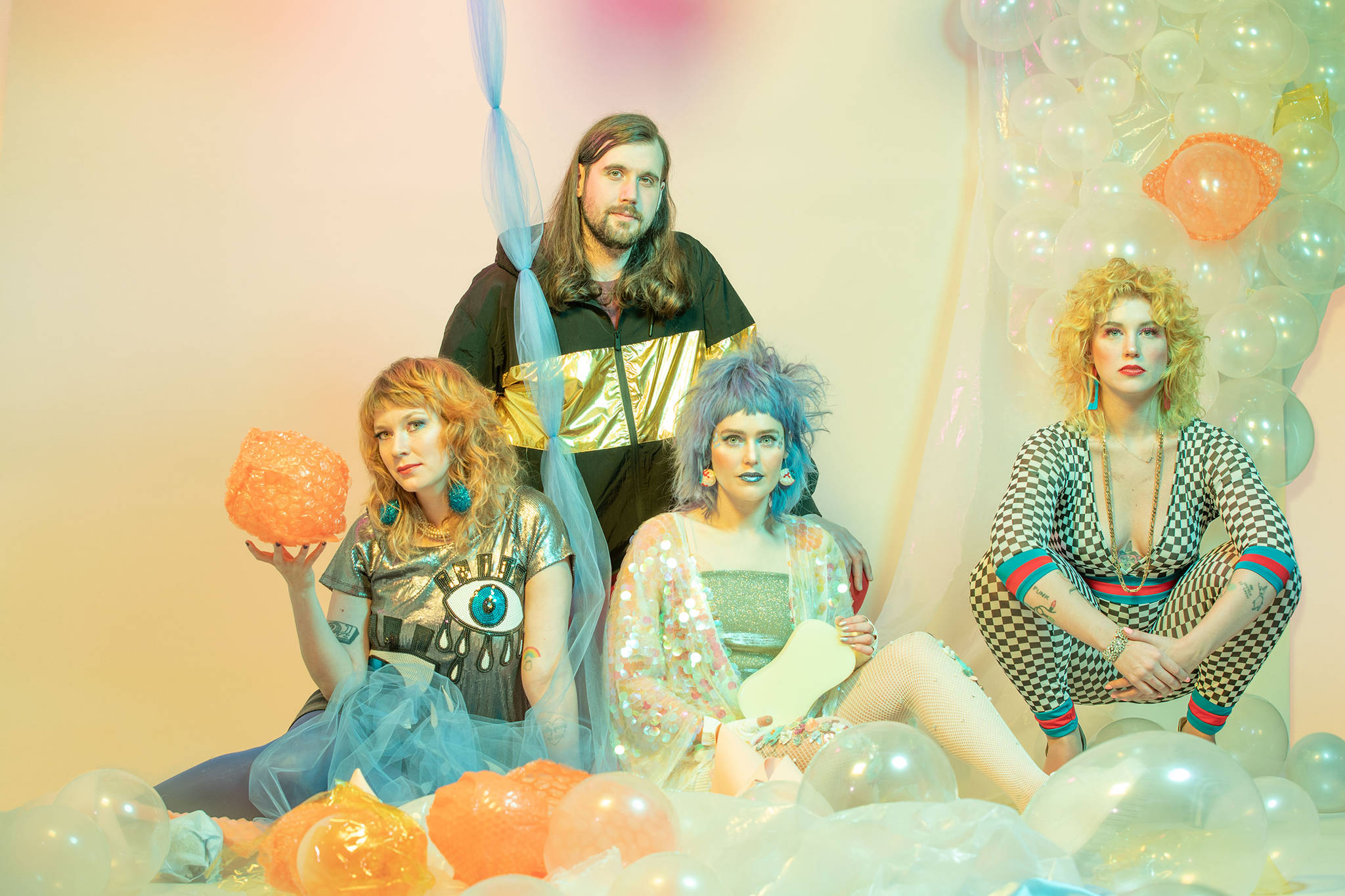Seattle ties its cultural cachet to rock music in a way few other cities do. From Jimi Hendrix to grunge to Heart and the current bumper crop of female-led acts, there’s a clear spot in the city’s heart for catchy hooks over distorted guitars. So the following claim doesn’t come lightly: Minus the Bear is one of the best Seattle rock bands of all time.
For 17 years, Minus the Bear has been a standout local innovator that’s used its members’ advanced musicianship to craft fresh new sonic realms and reinvigorate strands of progressive rock; experimental templates that hosts of indie and math rock bands would soon imitate. After close to two decades of globetrotting and garnering more and more fans along the way, the band’s journey comes to an end this weekend with three nights of sold-out concerts at The Showbox (Dec. 14–16).
Minus the Bear formed in 2001 as a somewhat unlikely collection from disparate bands. Guitarist Dave Knudson created noisy chaos in Tacoma metalcore outfit Botch; bassist Cory Murchy and drummer Erin Tate had been the rhythm section for Minneapolis post-hardcore act Kill Sadie; and singer/rhythm guitarist Jake Snider had fronted Seattle soft math rock band Sharks Keep Moving, whose records were produced by Matt Bayles, who’d take keyboard duties in Minus the Bear. (For the curious, the band name came from a lewd joke about a 1970s TV show that co-starred a monkey—Google it.)
After releasing its first EP (This Is What I Know About Being Gigantic) in 2001 on the band’s home label Suicide Squeeze, Minus the Bear really started turning heads with its first LP, 2002’s Highly Refined Pirates. The thing that instantly made it stand out from the rock pack was Knudson’s tapping guitar leads—ones that belied the normal use of tapping for aggressive, shredding solos, instead using the process to create unique, comparatively chill and melodic soundscapes (aided by Bayles’ electronic keys) with a math rock inkling.
“It’s pretty cool to play with a guitar player who comes in with stuff that you’re like, ‘What am I gonna do with this? This is insane, this is amazing. What can I add to this?’ ” says Murchy.
When Knudson’s tapping combined with the airtight rhythm section and Snider’s delivery of lyrics about hydroplaning, emotive bedroom connections, and the bliss that can be found at two-star hotels, Minus the Bear basically created their own distinctive casually flowing-while-technically driven brand of indie rock right out of the gate—one that soon became a go-to for new bands to ape. (Some attention was also garnered via the group’s absurdist song titles, including “Get Me Naked 2: Electric Boogaloo,” “Thanks for the Killer Game of Crisco® Twister,” and “Monkey!!! Knife!!! Fight!!!”—though the band soon moved away from this approach to avoid having it become its “thing.”)
The band began touring relentlessly, something that would come to define it. Minus the Bear wouldn’t shy away from repeated visits to cities, even smaller ones, which resulted in slowly but consistently building a dedicated fan base. (As someone who saw Minus the Bear play many times in Billings, Mont.—including on the first Pirates tour—I can confirm this firsthand.)
The band followed Pirates with the fan-favorite EP They Make Beer Commercials Like This. But even after just one LP, the band was already to make its first major sonic shift in order to stave off complacency. “We just wanted to keep moving forward,” says Murchy. “We never wanted to write the same record twice, much to our fans’ chagrin sometimes. [Laughs] There were definitely folks that were like, ‘I loved that last album, but this one isn’t cool.’ But then with that, we would gain 10 other fans that got it and would move forward with us.”
So those tap leads? Well, the band didn’t want it to be the signature of the sound. Instead, Knudson found another innovation—sampling guitar parts and playing loops of them live with his feet via Line 6 DL4 pedals. This kinetic, glitchy sound became a foundational element of LP #2, 2005’s Menos el Oso.
In addition to the musical progression, Snider’s lyrics hit emotional tone-poem highs: painting pictures of distances between bodies, childlike snow days, and beaches on the Mediterranian. The songs and the album’s Spanish title drew inspiration from a trip that the guys still fondly remember as a career highlight. “Our first tour overseas was in Spain, and it was only Spain,” says Snider. “We were touring with this Spanish band—Madee, one of the guys put our record out in Spain—and they were just really great guys. I remember one day specifically when we were in Alicante on the coast, on a beach hanging out with the boys. And we weren’t doing anything. It was just the experience of being in this place at this time in your late 20s looking out over the sea, and everything felt like it was going to happen.”
The third evolution of Minus the Bear came in the form of modernizing prog rock. Planet of Ice is an unabashedly huge rock record that leans into shredding and instrumental proficiency without taking on the noodling, jammy downside that other prog can lapse into. There’s no guitar gimmick other than trying to sound epic. “At first I didn’t want to be known as the band with all the tappy guitar riffs. And then [we] didn’t want to be known as the band with all the loopy riffs where I’m not even playing guitar,” says Knudson. “Inspiration from what you’re listening to also dictates that. For Planet of Ice, we were all listing to King Crimson, Yes, Mahavishnu Orchestra, all that stuff. You realize how you can kind of manipulate that and make it your own. That’s kind of the cycle of being a musician—wanting to gather new things from different influences and use them as your own.”
“I love the Menos el Oso and Planet of Ice era of the band,” says Snider. “Just in terms of the music, and also the feeling of being in the band at that time with the other guys and seeing the potential of what it could become. We were like, ‘Oh shit, we can do this for a job.’ ”
Planet of Ice also saw Minus the Bear’s first lineup change. While he stuck on to produce the record, Bayles wanted to focus on his production career. That led to a keyboardist opening that Alex Rose—who had a long history with the band—seamlessly filled. “I went to high school with Cory in New Mexico,” says Rose. “So I remember the moment somebody showed me Minus the Bear. I was in sort of a duplex, and we went down to hang out with our friends downstairs, and they said, ‘Hey, have you heard? This is Cory’s new band. They’re in Seattle.’ It was the Gigantic EP. And listening to it, I was kind of in disbelief—it was like, ‘Oh, wow.’ It was definitely my thing. I got really into them.”
“I moved up to Seattle not because of them or anything, just my time in Albuquerque felt like it was up,” adds Rose. “I wrote Cory on Friendster and said I’m trying to engineer and do music stuff if you know anyone I could talk to or learn from, and he invited me by the studio when they were making the Beer Commercials EP. And I became their sound guy for a couple of tours right after that. Even Matt, before he left, was like, ‘You wouldn’t want to do this job, would you?’ I’m like, ‘Hell yeah, I would.’ ”
Those first three LPs will stand as the foundation of Minus the Bear’s musical legacy, but they didn’t slow down at all. After releasing the Planet of Ice and the EP Acoustics, the group left Suicide Squeeze for Dangerbird Records and continued turning out albums and playing multiple extensive tours every year. The fourth full-length, 2010’s Omni, had a more dancy, sexier feel in part because of more prominent synth grooves, while its 2012 follow-up Infinity Overhead returned the band to its more shredding rock core. Minus the Bear then reached back into the vault for 2013’s Acoustics II and 2014’s B-side collection, Lost Loves. While the band continued to draw during this Dangerbird era, not sticking with the known easy of Suicide Squeeze is one of the group’s few regrets.
“One thing I would definitely tell myself if I could go back to when we were starting the band is appreciate people’s loyalty more,” says Snider. “Stick with the people that you trust, and try to find people that really believe in what you’re doing. There was a period mid-career when we went from Suicide Squeeze to Dangerbird. Though we did have a good situation with Dangerbird at the beginning, I think that staying with the people that helped the band become what it is [has value]. I would’ve suggested having some patience there and not worrying about what that next step could look like. We’ve made some changes that turned out to be beneficial, but usually the best decisions we’ve made have been ones where we find the folks that are fans of the band and not necessarily like ‘This band could sell some records’ or ‘This band could sell some rooms.’ ”
The end of the Dangerbird era coincided with Minus the Bear’s other major lineup change, as the band parted ways with Tate in January 2015 over creative differences.
Not content with calling it a day, the band returned to Suicide Squeeze in 2017 for its sixth and final LP, VOIDS. In some ways it felt like an amalgamation of all the preceding albums, taking choice bits and pieces from the band’s history, stirring them together, and coming up with a tasty end result. But as the band ended the support cycle for the record, the finish line seemed to approach. “It was great doing VOIDS, but we haven’t really had a break,” says Rose. “It feel like a good time to move on, and possibly do other things artistically and musically. The fact that we do have to be gone to earn a living is stressful for everybody’s family and home life. So for multiple reasons, sanity and other, [ending it] feels right.”
“I’m 42, and I’ve got a couple kids,” says Snider, “and it just gets more difficult to be away for the stretches of time that you need to be away to make this work. We could’ve done another record and gone a few more years, but I feel like, at my age, I might be young enough to do another thing and see what else is out there for me.”
With that in mind, the band announced in July that it would release one final EP, Fair Enough, and then disband at the end of a farewell tour. That tour wraps up with three Showbox gigs this Friday through Sunday.
“17 years on the road takes its toll,” says Murchy. “It’s amazing, I love it. I love being onstage, but it’s all that down time that kind of starts gnawing at you. We never wanted to fizzle out and go away softly. We wanted to go out on our terms, and this just seemed like the right time to do it. I’m just thankful for what we’ve been able to do. I love these guys so much. It’s pretty cool that we can still be friends 17 years into this. A lot of times people get eaten up and spit out, and it’s pretty cool that we’ve figured out how to keep the ship right enough to pull it into port.”
“The worst thing for a band to do is keep going and write bad records, and not really feel it,” says Knudson. “I think this is a way to really make it meaningful for everyone involved in the musical side of it and make it meaningful for the fans as well.”
Knowing this is the end has made things extra-special this time for both the band and its fans. And surprisingly, it’s not been a bummer. “I expected it to be sadder than it is,” says Snider. “I was fully prepared to be pretty emotional every night on some level. I was a little bit afraid of that. Each night is the last night in that city, so for those folks, it’s the last time they’ll get to see us. And instead of having that feeling of sadness, it’s been a real party. It’s been a lot of fun and the crowds have been incredibly happy. So it’s been a surprisingly different experience than I expected. You see a couple of tears in the crowd, but for me it’s been pretty affirming.”
“It’s kind of overwhelming,” adds Knudson. “Sometimes onstage I’m getting a little choked up.”
Because of the touring regimen over almost two decades, the band hears stories from fans who have been to dozens upon dozens of shows at various meet-and-greets. “Ultimately, the connection with the fans has been just incredibly overwhelming,” says Murchy. “I think we all knew that we had made something that resonates with people, just because we knew people had come out to 20 or 30 shows through the years.”
“It’s pretty incredible the stories that we’re getting from the fans,” he continues. “We had a vet come up to us the other day and was saying, ‘My bunkmate in Iraq showed me your song and I was like, ‘Holy crap! What is this? Gimme more.’ And in the same breath he said, ‘That week saved my life a week later.’ And that connection to the band, he expressed how important it was. And that’s humbling. We’ve had fans that have come up and said, ‘Thank you for helping me get sober. Your music helped me stay alive.’ And I don’t take that lightly, because [it] saved my life. And there are bands out there that did the same thing for me. So to think that even if there’s just one person that it resonated with in such a way, it’s incredible. It’s something that I’ll never forget.”
Setting their own endpoint has also allowed the members of Minus the Bear to reflect on what the band will leave behind. The two aspects that seem to resonate most with the guys are how the band continually shifted sounds to avoid falling into stale predictability, and how each member contributed to the strength of the collective. The detail each musician brought to the table meant that many fans had different favorite members, but it all served the greater whole.
“We have a lot of different sounds and eras, but it is a group and the sum of its parts,” says Rose. “A lot of people gravitate to some of the individual musicians, or the lyrics, or just the overall sound, but the fact that it doesn’t fit anywhere tidily is maybe the positive and the reason that we have such diehards. We’re kind of our own unique beast. We haven’t really had any rules. We’ve always been like ‘Let’s make weird music,’ but make it catchy and sorta dancy or whatever, but let’s definitely make it strange.”
“There are a lot of layers to unpack within each song, each record, each note,” says Knudson. “Sometimes we’ve described songs as being an onion. You can peel back certain layers and hopefully the songs reveal themselves, and hopefully fans can appreciate new things every time they listen to a song. That was a goal of the band, and I hope that will live on after the band’s over.”
Minus the Bear
December 14–16 | The Showbox | Sold Out
